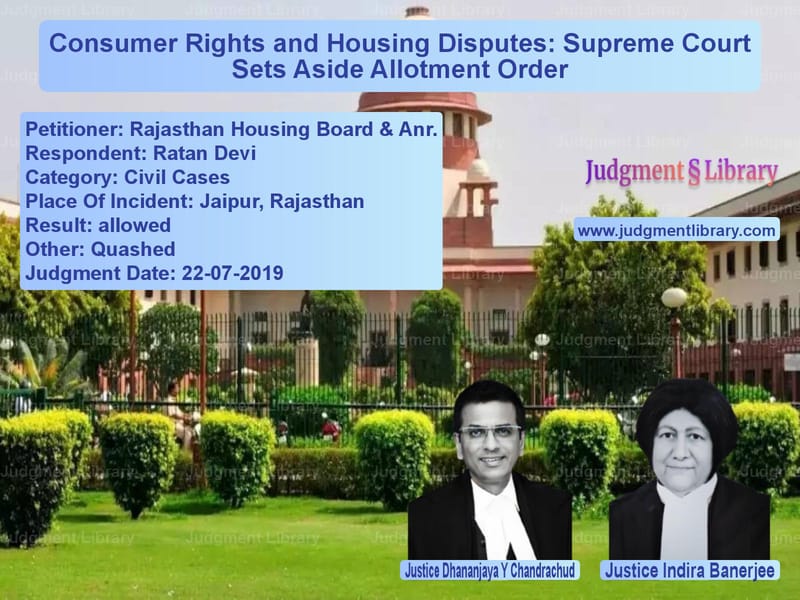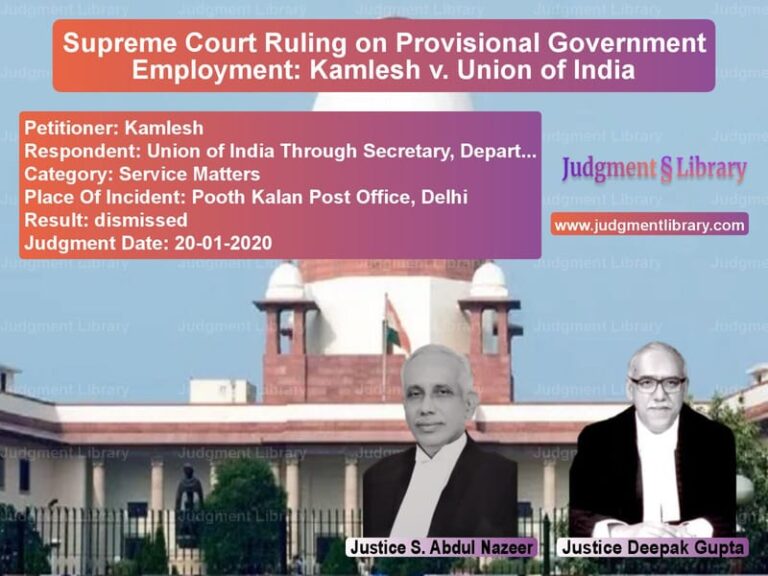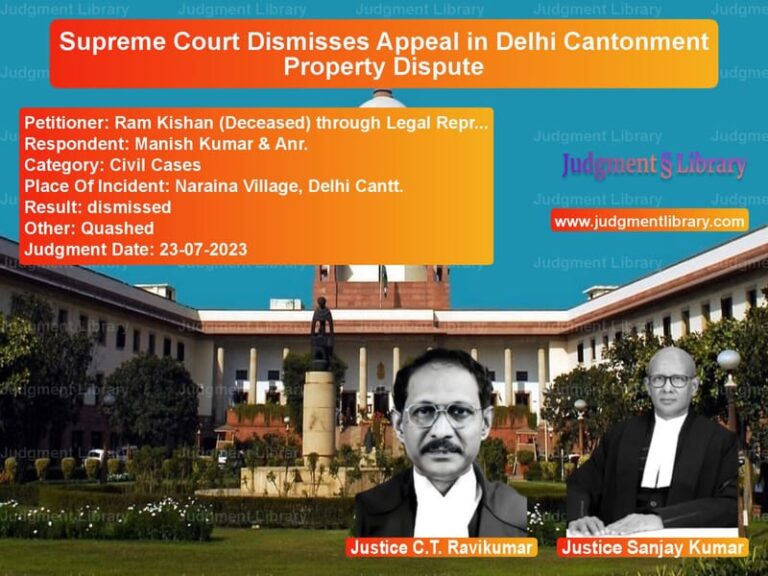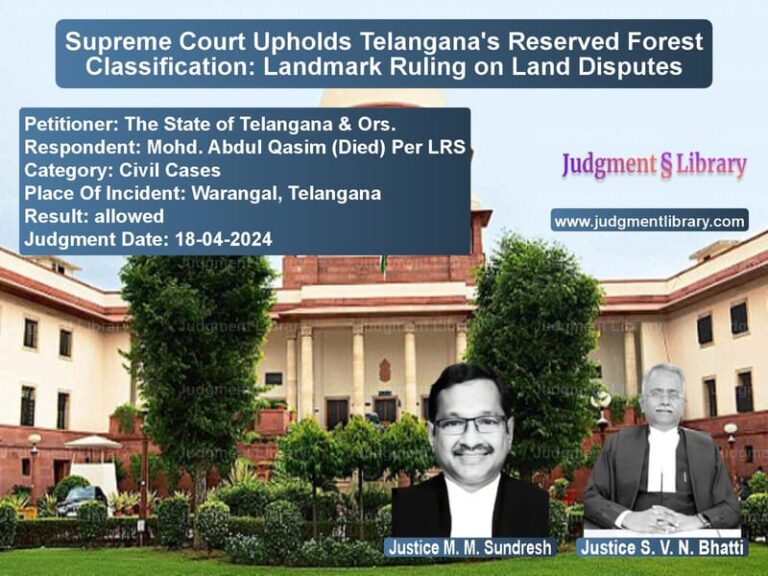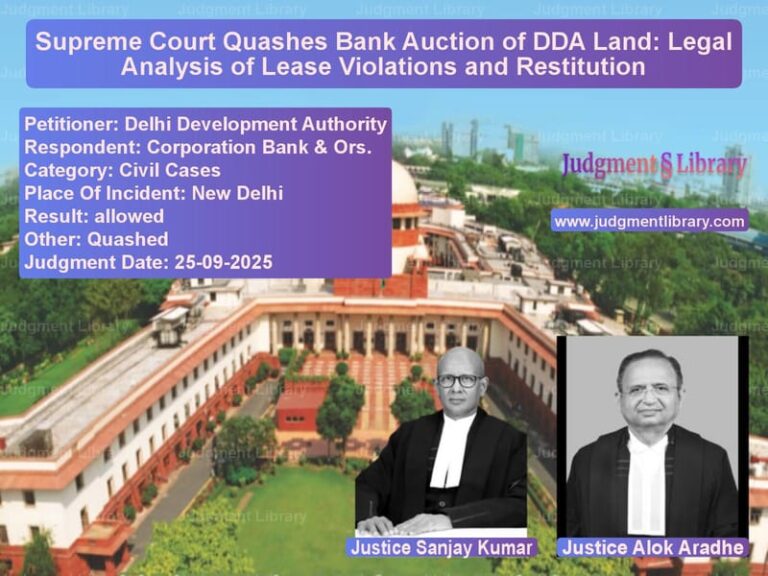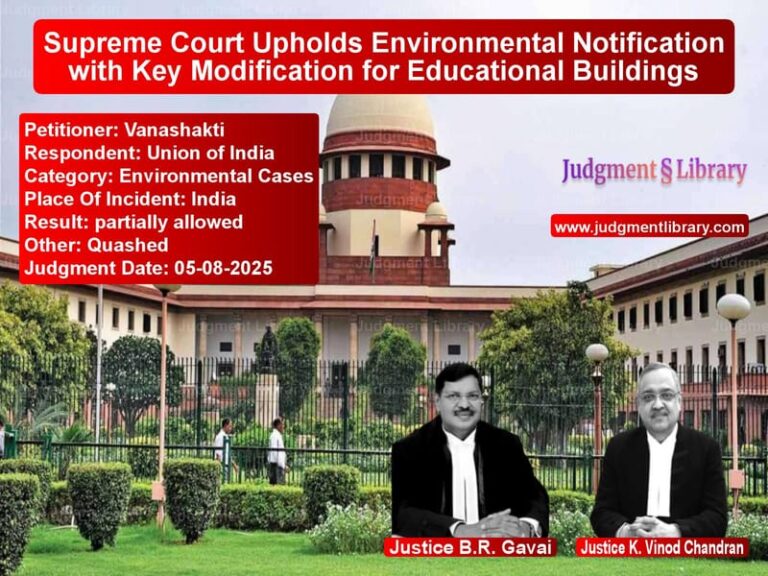Consumer Rights and Housing Disputes: Supreme Court Sets Aside Allotment Order
The case of Rajasthan Housing Board & Anr. v. Ratan Devi addresses the issue of housing allotments and consumer rights. The Supreme Court overturned the National Consumer Disputes Redressal Commission (NCDRC) order that directed the Rajasthan Housing Board to allot a low-income group (LIG) tenement to the respondent. The judgment provides clarity on the obligations of housing authorities and the rights of applicants under consumer law.
Background of the Case
The dispute began in 1990 when the respondent, Ratan Devi, applied for an LIG tenement under the Mansarover Scheme of the Rajasthan Housing Board. She deposited an initial amount of Rs. 4,000 on February 21, 1991. The Housing Board issued an allotment letter on April 30, 1992, stating that a balance of Rs. 47,674 was payable at the time of possession.
Key Facts of the Case
- The respondent claimed that she never received a possession letter, preventing her from making the remaining payment.
- The Housing Board asserted that since she did not pay the balance amount, the allotment was canceled on April 6, 1994.
- The respondent disputed having received the cancellation notice.
- She approached the District Consumer Disputes Redressal Forum, Jaipur, in 2008, almost 16 years after the allotment.
- The District Forum ruled in her favor and directed the Housing Board to allot her the tenement at the original rate of Rs. 47,674.
- The State Consumer Disputes Redressal Commission (SCDRC) overturned the District Forum’s order.
- The respondent appealed to the NCDRC, which restored the District Forum’s order.
- The Housing Board challenged the NCDRC order in the Supreme Court.
Arguments of the Parties
Petitioner’s (Rajasthan Housing Board) Argument
- The Housing Board argued that the respondent failed to pay the balance amount in time.
- The cancellation notice was issued in 1994, and she did not challenge it for more than a decade.
- The Board cannot be compelled to allot the house at the original 1992 price, as the market value had significantly increased.
- The respondent had acknowledged in letters dated April 15, 1996, and May 4, 2008, that she could not pay the amount due to financial constraints.
- The consumer complaint was filed after an unreasonable delay of 16 years, making it time-barred.
Respondent’s (Ratan Devi’s) Argument
- She argued that she did not receive any possession letter from the Board, preventing her from making the payment.
- The Board’s decision to cancel the allotment was arbitrary and unfair.
- The Housing Board had never refunded the initial deposit, showing their failure to honor their obligations.
Supreme Court’s Analysis
Timeliness of the Consumer Complaint
The Court noted that the respondent waited 16 years to file a consumer complaint, far beyond the limitation period prescribed under the Consumer Protection Act, 1986. The Court emphasized:
“In this factual background, the complaint before the District Forum was hopelessly delayed and was filed beyond the period of limitation as prescribed under the Consumer Protection Act, 1986.”
Obligations of the Respondent
The Court reviewed the letters submitted by the respondent in 1996 and 2008, where she admitted financial difficulties in making the payment. The Court found that:
“The respondent was not in a position to comply with the terms of the allotment which required the payment of the balance amount of Rs 47,674.”
Validity of the NCDRC Order
The Court held that the NCDRC erred in directing the Housing Board to allot the tenement at 1992 rates. It ruled:
“The authority could not have been held down to the rates of 1992. There is no basis in principle for such a direction.”
Final Judgment
The Supreme Court set aside the NCDRC order and ruled in favor of the Rajasthan Housing Board. However, exercising its powers under Article 142 of the Constitution of India, the Court directed the Housing Board to refund the respondent’s initial deposit and additional compensation.
“We are of the view that the respondent should be paid a total amount of Rs 1 lakh by the appellant, over and above the litigation expenses as directed by this Court.”
The amount was to be paid within two months.
Significance of the Judgment
- Timeliness in Consumer Cases: The ruling reaffirms that consumer complaints must be filed within the prescribed limitation period.
- Obligation to Pay Balance Amount: The judgment clarifies that applicants must fulfill their payment obligations to retain their allotment.
- Housing Authorities’ Responsibilities: The ruling protects housing boards from being compelled to allot properties at outdated rates.
- Compensation for Delay: Despite ruling against the respondent, the Court ensured she was compensated for the long-drawn litigation.
Conclusion
The Supreme Court’s ruling in Rajasthan Housing Board v. Ratan Devi sets an important precedent for housing disputes under consumer law. It emphasizes the importance of timely legal action and reinforces the obligations of both consumers and housing authorities. The judgment ensures a fair balance between consumer rights and institutional responsibilities in housing allotments.
Petitioner Name: Rajasthan Housing Board & Anr..Respondent Name: Ratan Devi.Judgment By: Justice Dhananjaya Y Chandrachud, Justice Indira Banerjee.Place Of Incident: Jaipur, Rajasthan.Judgment Date: 22-07-2019.
Don’t miss out on the full details! Download the complete judgment in PDF format below and gain valuable insights instantly!
Download Judgment: Rajasthan Housing Bo vs Ratan Devi Supreme Court of India Judgment Dated 22-07-2019.pdf
Direct Downlaod Judgment: Direct downlaod this Judgment
See all petitions in Property Disputes
See all petitions in Consumer Rights
See all petitions in Judgment by Dhananjaya Y Chandrachud
See all petitions in Judgment by Indira Banerjee
See all petitions in allowed
See all petitions in Quashed
See all petitions in supreme court of India judgments July 2019
See all petitions in 2019 judgments
See all posts in Civil Cases Category
See all allowed petitions in Civil Cases Category
See all Dismissed petitions in Civil Cases Category
See all partially allowed petitions in Civil Cases Category

